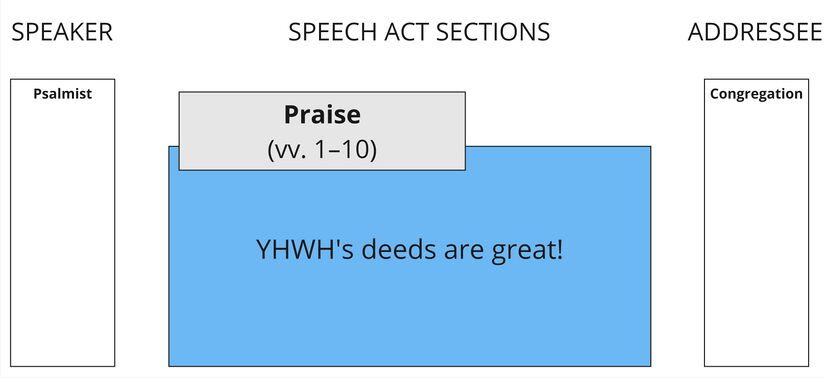Psalm 111 Speech Act
From Psalms: Layer by Layer
Psalm 111/Speech Act
Choose a PsalmNavigate Psalm 111
Guardian: Ryan Sikes
Speech Act Analysis
The Speech Act layer presents the text in terms of what it does, following the findings of Speech Act Theory. It builds on the recognition that there is more to communication than the exchange of propositions. Speech act analysis is particularly important when communicating cross-culturally, and lack of understanding can lead to serious misunderstandings, since the ways languages and cultures perform speech acts varies widely.
For a detailed explanation of our method, see the Speech Act Analysis Creator Guidelines.
Speech Act Analysis Chart
The following chart is scrollable (left/right; up/down).
| Verse | Hebrew | CBC | Sentence type | Illocution (general) | Illocution with context | Macro speech act | Intended perlocution (Think) | Intended perlocution (Feel) | Intended perlocution (Do) |
| Verse number and poetic line | Hebrew text | English translation | Declarative, Imperative, or Interrogative Indirect Speech Act: Mismatch between sentence type and illocution type |
Assertive, Directive, Expressive, Commissive, or Declaratory Indirect Speech Act: Mismatch between sentence type and illocution type |
More specific illocution type with paraphrased context | Illocutionary intent (i.e. communicative purpose) of larger sections of discourse These align with the "Speech Act Summary" headings |
What the speaker intends for the address to think | What the speaker intends for the address to feel | What the speaker intends for the address to do |
If an emendation or revocalization is preferred, that emendation or revocalization will be marked in the Hebrew text of all the visuals.
| Emendations/Revocalizations legend | |
|---|---|
| *Emended text* | Emended text, text in which the consonants differ from the consonants of the Masoretic text, is indicated by blue asterisks on either side of the emendation. |
| *Revocalized text* | Revocalized text, text in which only the vowels differ from the vowels of the Masoretic text, is indicated by purple asterisks on either side of the revocalization. |
| Verse | Text (Hebrew) | Text (CBC) The Close-but-clear translation (CBC) exists to provide a window into the Hebrew text according to how we understand its syntax and word-to-phrase-level semantics. It is designed to be "close" to the Hebrew, while still being "clear." Specifically, the CBC encapsulates and reflects the following layers of analysis: grammar, lexical semantics, phrase-level semantics, and verbal semantics. It does not reflect our analysis of the discourse or of poetics. It is not intended to be used as a stand-alone translation or base text, but as a supplement to Layer-by-Layer materials to help users make full use of these resources. | Sentence type | Illocution (general) | Illocution with context | Macro speech act | Intended perlocution (Think) | Intended perlocution (Feel) | Intended perlocution (Do) | Speech Act Notes | |
|---|---|---|---|---|---|---|---|---|---|---|---|
| 1 | הַ֥לְלוּ יָ֨הּ ׀ | Praise Yah! | Superscription | • The psalmist effectively announces the global speech act at the beginning of the psalm: אוֹדֶה יְהוָה (cf. Ps. 9; 138; cf. other Pss. beginning with הודו [e.g., Pss. 105; 106; 107; 118; 136] or הודינו [Ps. 75]). In most of these Psalms, there is an emphasis throughout on YHWH's great deeds, especially his past acts of deliverance (cf. the frequent parallel of ידה/תודה and ספר נפלאות [e.g., Pss. 9:2; 26:7; 75:2; cf. 79:13; 107:22]). A number of the psalms in the Qumran Hodayot also begin with אודה/אודך. • The verb "praise" (ידה hiphil) refers to an "action by which humans openly express recognition of what someone else has done or achieved" (SDBH). (See lexical semantics for details.) • One object of the praise is to move the hearers ("the upright," v. 1) to keep YHWH's commands (cf. vv. 7b, 9bc, 10ab). The appropriate response to what YHWH has done is to do what YHWH has commanded; the appropriate response to his covenant faithfulness (cf. v. 5b) is covenant faithfulness (cf. v. 9b).
| |||||||
| אוֹדֶ֣ה יְ֭הוָה בְּכָל־לֵבָ֑ב | I will praise YHWH whole-heartedly | Imperative | Commissive | Expressing his desire and intention to praise YHWH. | Praising YHWH. | Listeners will consider themselves as part of the congregation of the upright. | Listeners will be whole-heartedly determined to praise YHWH. | Listeners will join the psalmist in praising YHWH. | • Although אוֹדֶה, in terms of its morphology, could be either a yiqtol or a cohortative, its use in similar contexts alongside morphologically cohortative verbs suggests that it is a cohortative here as well (cf. Pss. 7:18; 9:2–3; 54:8). • "The cohortative expresses the will or strong desire of the speaker. In cases where the speaker has the ability to carry out an inclination it takes on the coloring of resolve ('I will...')" (IBHS 34.5.1)
| ||
| בְּס֖וֹד יְשָׁרִ֣ים וְעֵדָֽה׃ | in the council of upright people, in the congregation. | ||||||||||
| 2 | גְּ֭דֹלִים מַעֲשֵׂ֣י יְהוָ֑ה | YHWH’s deeds are great, | Declarative | Assertive | Praising YHWH for his great deeds. | Listeners will acknowledge the wondrous nature of YHWH's works. | Listeners will praise YHWH for his wondrous works. | ||||
| דְּ֝רוּשִׁ֗ים לְכָל־חֶפְצֵיהֶֽם׃ | studied by all who delight in them. | ||||||||||
| 3 | הוֹד־וְהָדָ֥ר פָּֽעֳל֑וֹ | His work is glorious and majestic, | Declarative | Assertive | Praising YHWH for his glorious and majestic work. | ||||||
| וְ֝צִדְקָת֗וֹ עֹמֶ֥דֶת לָעַֽד׃ | and his righteousness stands forever. | Declarative | Assertive | Praising YHWH for his enduring righteousness. | |||||||
| 4 | זֵ֣כֶר עָ֭שָׂה לְנִפְלְאֹתָ֑יו | He has caused his wonderful acts to be remembered. | Declarative | Assertive | Praising YHWH for causing his wonderful acts to be remembered. | Listeners will remember YHWH's covenant faithfulness. | Listeners will be faithful to YHWH's covenant. | ||||
| חַנּ֖וּן וְרַח֣וּם יְהוָֽה׃ | YHWH is merciful and compassionate. | Declarative | Assertive | Praising YHWH for his mercy and compassion. | |||||||
| 5 | טֶ֭רֶף נָתַ֣ן לִֽירֵאָ֑יו | He gave food to those who feared him. | Declarative | Assertive | Praising YHWH for providing for his people. | ||||||
| יִזְכֹּ֖ר לְעוֹלָ֣ם בְּרִיתֽוֹ׃ | He will remember his covenant forever. | Declarative | Assertive | Praising YHWH for his covenant faithfulness. | |||||||
| 6 | כֹּ֣חַ מַ֭עֲשָׂיו הִגִּ֣יד לְעַמּ֑וֹ | He showed his people the power of his deeds | Declarative | Assertive | Praising YHWH for his demonstration of strength. | ||||||
| לָתֵ֥ת לָ֝הֶ֗ם נַחֲלַ֥ת גּוֹיִֽם׃ | by giving them nations as an inheritance. | ||||||||||
| 7 | מַעֲשֵׂ֣י יָ֭דָיו אֱמֶ֣ת וּמִשְׁפָּ֑ט | The deeds of his hands are faithful and just. | Declarative | Assertive | Praising YHWH for his faithful and just deeds. | Listeners will acknowledge the righteousness of YHWH's commands. | Listeners will do what YHWH has commanded. | ||||
| נֶ֝אֱמָנִ֗ים כָּל־פִּקּוּדָֽיו׃ | All his commandments are enduring, | Declarative | Assertive | Praising YHWH for his commandments. | |||||||
| 8 | סְמוּכִ֣ים לָעַ֣ד לְעוֹלָ֑ם | established forever and ever, | |||||||||
| עֲ֝שׂוּיִ֗ם בֶּאֱמֶ֥ת וְיָשָֽׁר׃ | practiced in faithfulness and uprightness. | ||||||||||
| 9 | פְּד֤וּת ׀ שָׁ֘לַ֤ח לְעַמּ֗וֹ | He sent redemption to his people. | Declarative | Assertive | Praising YHWH for redeeming his people. | Listeners will remember YHWH's holiness and covenant faithfulness. | Listeners will be faithful to YHWH's covenant. | ||||
| לְעַמּ֗וֹ צִוָּֽה־לְעוֹלָ֥ם בְּרִית֑וֹ | He commanded his covenant forever. | Declarative | Assertive | Praising YHWH for commanding his covenant. | |||||||
| קָד֖וֹשׁ וְנוֹרָ֣א שְׁמֽוֹ׃ | His name is holy and awesome. | Declarative | Assertive | Praising YHWH for his holiness and awesomeness. | |||||||
| 10 | רֵ֘אשִׁ֤ית חָכְמָ֨ה ׀ יִרְאַ֬ת יְהוָ֗ה | Fearing YHWH is the beginning of wisdom; | Declarative | Assertive | Praising YHWH for the wisdom that comes from fearing him. | Listeners will value the fear of YHWH and wisdom. | Listeners will be in reverent fear of YHWH. | Listeners will keep YHWH's commandments; listeners will praise YHWH. | |||
| שֵׂ֣כֶל ט֭וֹב לְכָל־עֹשֵׂיהֶ֑ם | all who practice them have good insight. | Declarative | Assertive | Praising YHWH for the good insight that comes from practicing his commands. | |||||||
| תְּ֝הִלָּת֗וֹ עֹמֶ֥דֶת לָעַֽד׃ | His praiseworthiness stands forever. | Declarative | Assertive | Praising YHWH for his enduring praiseworthiness. | |||||||


